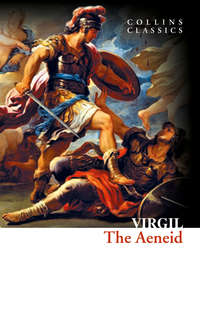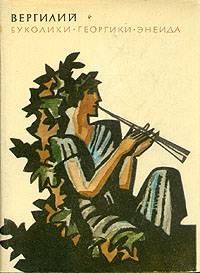 полная версия
полная версияThe Aeneid of Virgil
BOOK TWELFTH
THE SLAYING OF TURNUS
When Turnus sees the Latins broken and fainting in the thwart issue of war, his promise claimed for fulfilment, and men's eyes pointed on him, his own spirit rises in unappeasable flame. As the lion in Phoenician fields, his breast heavily wounded by the huntsmen, at last starts into arms, and shakes out the shaggy masses from his exultant neck, and undismayed snaps the brigand's planted weapon, roaring with blood-stained mouth; even so Turnus kindles and swells in passion. Then he thus addresses the king, and so furiously begins:
'Turnus stops not the way; there is no excuse for the coward Aeneadae to take back their words or renounce their compact. I join battle; bring the holy things, my lord, and swear the treaty. Either this hand shall hurl to hell the Dardanian who skulks from Asia, and the Latins sit and see my single sword wipe out the nation's reproach; or let him rule his conquest, and Lavinia pass to his espousal.'
To him Latinus calmly replied: 'O excellent young man! the more thy hot valour abounds, the more intently must I counsel, and weigh fearfully what may befall. Thou hast thy father Daunus' realm, hast many towns taken by thine hand, nor is Latinus lacking in gold and goodwill. There are other maidens unwedded in Latium and Laurentine fields, and of no mean birth. Let me unfold this hard saying in all sincerity: and do thou drink it into thy soul. I might not ally my daughter to any of her old wooers; such was the universal oracle of gods and men. Overborne by love for thee, overborne by kinship of blood and my weeping wife's complaint, I broke all fetters, I severed the maiden from her promised husband, I took up unrighteous arms. Since then, Turnus, thou seest what calamities, what wars pursue me, what woes thyself before all dost suffer. Twice vanquished in pitched battle, we scarce guard in our city walls the hopes of Italy: the streams of Tiber yet run warm with our blood, and our bones whiten the boundless plain. Why fall I away again and again? what madness bends my purpose? if I am ready to take them into alliance after Turnus' destruction, why do I not rather bar the strife while he lives? What will thy Rutulian kinsmen, will all Italy say, if thy death—Fortune make void the word!—comes by my betrayal, while thou suest for our daughter in marriage? Cast a glance on war's changing fortune; pity thine aged father, who now far away sits sad in his native Ardea.'
In nowise do the words bend Turnus' passion: he rages the more fiercely, and sickens of the cure. So soon as he found speech he thus made utterance:
'The care thou hast for me, most gracious lord, for me lay down, I implore thee, and let me purchase honour with death. Our hand too rains weapons, our steel is strong; and our wounds too draw blood. The goddess his mother will be far from him to cover his flight, woman-like, in a cloud and an empty phantom's hiding.'
But the queen, dismayed by the new terms of battle, wept, and clung to her fiery son as one ready to die: 'Turnus, by these tears, by Amata's regard, if that touches thee at all—thou art now the one hope, the repose of mine unhappy age; in thine hand is Latinus' honour and empire, on thee is the weight of all our sinking house—one thing I beseech thee; forbear to join battle with the Teucrians. What fate soever awaits thee in the strife thou seekest, it awaits me, Turnus, too: with thee will I leave the hateful light, nor shall my captive eyes see Aeneas my daughter's lord.' Lavinia tearfully heard her mother's words with cheeks all aflame, as deep blushes set her face on fire and ran hotly over it. Even as Indian ivory, if one stain it with sanguine dye, or where white lilies are red with many a rose amid: such colour came on the maiden's face. Love throws him into tumult, and stays his countenance on the girl: he burns fiercer for arms, and briefly answers Amata:
'Do not, I pray thee, do not weep for me, neither pursue me thus ominously as I go to the stern shock of war. Turnus is not free to dally with death. Thou, Idmon, bear my message to the Phrygian monarch in this harsh wording: So soon as to-morrow's Dawn rises in the sky blushing on her crimson wheels, let him not loose Teucrian or Rutulian: let Teucrian and Rutulian arms have rest, and our blood decide the war; on that field let Lavinia be sought in marriage.'
These words uttered, withdrawing swiftly homeward, he orders out his horses, and rejoicingly beholds them snorting before his face: those that Orithyia's self gave to grace Pilumnus, such as would excel the snows in whiteness and the gales in speed. The eager charioteers stand round and pat their chests with clapping hollowed hands, and comb their tressed manes. Himself next he girds on his shoulders the corslet stiff with gold and pale mountain-bronze, and buckles on the sword and shield and scarlet-plumed helmet-spikes: that sword the divine Lord of Fire had himself forged for his father Daunus and dipped glowing in the Stygian wave. Next, where it stood amid his dwelling leaning on a massy pillar, he strongly seizes his stout spear, the spoil of Actor the Auruncan, and brandishes it quivering, and cries aloud: 'Now, O spear that never hast failed at my call, now the time is come; thee princely Actor once, thee Turnus now wields in his grasp. Grant this strong hand to strike down the effeminate Phrygian, to rend and shatter the corslet, and defile in dust the locks curled with hot iron and wet with myrrh.' Thus madly he runs on: sparkles leap out from all his blazing face, and his keen eyes flash fire: even as the bull when before his first fight he bellows awfully, and drives against a tree's trunk to make trial of his angry horns, and buffets the air with blows or scatters the sand in prelude of battle.
And therewithal Aeneas, terrible in his mother's armour, kindles for warfare and awakes into wrath, rejoicing that offer of treaty stays the war. Comforting his comrades and sorrowing Iülus' fear, he instructs them of destiny, and bids bear answer of assurance to King Latinus, and name the laws of peace.
Scarcely did the morrow shed on the mountain-tops the beams of risen day, as the horses of the sun begin to rise from the deep flood and breathe light from their lifted nostrils; Rutulian and Teucrian men measured out and made ready a field of battle under the great city's ramparts, and midway in it hearth-fires and grassy altars to the gods of both peoples; while others bore spring water and fire, draped in priestly dress and their brows bound with grass of the field. The Ausonian army issue forth, and crowd through the gates in streaming serried columns. On this side all the Trojan and Tyrrhenian host pour in diverse armament, girt with iron even as though the harsh battle-strife called them forth. Therewith amid their thousands the captains dart up and down, splendid in gold and purple, Mnestheus, seed of Assaracus, and brave Asilas, and Messapus, tamer of horses, brood of Neptune: then each on signal given retired to his own ground; they plant their spears in the earth and lean their shields against them. Mothers in eager abandonment, and the unarmed crowd and feeble elders beset towers and house-roofs, or stand at the lofty gates.
But Juno, on the summit that is now called the Alban—then the mountain had neither name nor fame or honour—looked forth from the hill and surveyed the plain and double lines of Laurentine and Trojan, and Latinus' town. Straightway spoke she thus to Turnus' sister, goddess to goddess, lady of pools and noisy rivers: such worship did Jupiter the high king of air consecrate to her for her stolen virginity:
'Nymph, grace of rivers, best beloved of our soul, thou knowest how out of all the Latin women that ever rose to high-hearted Jove's thankless bed, thee only have I preferred and gladly given part and place in heaven. Learn thy woe, that thou blame not me for it, Juturna. Where fortune seemed to allow and the Destinies granted Latinus' estate to prosper, I shielded Turnus and thy city. Now I see him joining battle with unequal fates, and the day of doom and deadly force draws nigh. Mine eyes cannot look on this battle and treaty: thou, if thou darest aught of more present help for the brother of thy blood, go on; it befits thee. Haply relief shall follow misery.'
Scarcely thus: when Juturna's eyes overbrimmed with tears, and thrice and again she smote her hand on her gracious breast. 'This is not time for tears,' cries Juno, daughter of Saturn: 'hasten and snatch thy brother, if it may be, from his death; or do thou waken war, and make the treaty abortive. I encourage thee to dare.' With such urgence she left her, doubting and dismayed, and grievously wounded in soul.
Meanwhile the kings go forth; Latinus in mighty pomp rides in his four-horse chariot; twelve gilded rays go glittering round his brows, symbol of the Sun his ancestor; Turnus moves behind a white pair, clenching in his hand two broad-headed spears. On this side lord Aeneas, fount of the Roman race, ablaze in starlike shield and celestial arms, and close by Ascanius, second hope of mighty Rome, issue from the camp; and the priest, in spotless raiment, hath brought the young of a bristly sow and an unshorn sheep of two years old, and set his beasts by the blazing altars. They, turning their eyes towards the sunrising, scatter salted corn from their hands and clip the beasts with steel over the temples, and pour cups on the altars. Then Aeneas the good, with sword drawn, thus makes invocation:
'Be the Sun now witness, and this Earth to my call, for whose sake I have borne to suffer so sore travail, and the Lord omnipotent, and thou his wife, at last, divine daughter of Saturn, at last I pray more favourable; and thou, mighty Mavors, who wieldest all warfare in lordship beneath thy sway; and on the Springs and Rivers I call, and the Dread of high heaven, and the divinities of the blue seas: if haply victory fall to Turnus the Ausonian, the vanquished make covenant to withdraw to Evander's city; Iülus shall quit the soil; nor ever hereafter shall the Aeneadae return in arms to renew warfare, or attack this realm with the sword. But if Victory grant battle to us and ours (as I think the rather, and so the rather may the gods seal their will), I will not bid Italy obey my Teucrians, nor do I claim the realm for mine; let both nations, unconquered, join treaty for ever under equal law. Gods and worship shall be of my giving: my father Latinus shall bear the sword, and have a father's prescribed command. For me my Teucrians shall establish a city, and Lavinia give the town her name.'
Thus Aeneas first: thereon Latinus thus follows:
'By these same I swear, O Aeneas, by Earth, Sea, Sky, and the twin brood of Latona and Janus the double-facing, and the might of nether gods and grim Pluto's shrine; this let our Father hear, who seals treaties with his thunderbolt. I touch the altars, I take to witness the fires and the gods between us; no time shall break this peace and truce in Italy, howsoever fortune fall; nor shall any force turn my will aside, not if it dissolve land into water in turmoil of deluge, or melt heaven in hell: so surely as this sceptre' (for haply he bore a sceptre in his hand) 'shall never burgeon into thin leafage and shady shoot, since once in the forest cut down right to the stem it lost its mother, and the steel lopped away its tressed arms: a tree of old: now the craftsman's hand hath bound it in adornment of brass and given it to our Latin fathers' bearing.'
With such words they sealed mutual treaty midway in sight of the princes. Then they duly slay the consecrated beasts over the flames, and tear out their live entrails, and pile the altars with laden chargers.
But long ere this the Rutulians deemed the battle unequal, and their hearts are stirred in changeful motion; and now the more, as they discern nigher that in ill-matched strength . . . . heightened by Turnus, as advancing with noiseless pace he humbly worships at the altar with downcast eye, by his wasted cheeks and the pallor on his youthful frame. Soon as Juturna his sister saw this talk spread, and the people's mind waver in uncertainty, into the mid ranks, in feigned form of Camertus—his family was high in long ancestry, and his father's name for valour renowned, and himself most valiant in arms—into the mid ranks she glides, not ignorant of her task, and scatters diverse rumours, saying thus: 'Shame, O Rutulians! shall we set one life in the breach for so many such as these? are we unequal in numbers or bravery? See, Troy and Arcadia is all they bring, and those fate-bound bands that Etruria hurls on Turnus. Scarce is there an enemy to meet every other man of ours. He indeed will ascend to the gods for whose altars he devotes himself, and move living in the lips of men: we, our country lost, shall bow to the haughty rigour of our lords, if we now sit slackly on the field.'
By such words the soldiers' counsel was kindled yet higher and higher, and a murmur crept through their columns; the very Laurentines, the very Latins are changed; and they who but now hoped for rest from battle and rescue of fortune now desire arms and pray the treaty were undone, and pity Turnus' cruel lot. To this Juturna adds a yet stronger impulse, and high in heaven shews a sign more potent than any to confuse Italian souls with delusive augury. For on the crimsoned sky Jove's tawny bird flew chasing, in a screaming crowd, fowl of the shore that winged their column; then suddenly stooping to the water, pounces on a noble swan with merciless crooked talons. The startled Italians watch, while all the birds together clamorously wheel round from flight, wonderful to see, and dim the sky with their pinions, and in thickening cloud urge their foe through air, till, conquered by their attack and his heavy prey, he yielded and dropped it from his talons into the river, and winged his way deep into the clouds. Then indeed the Rutulians clamorously greet the omen, and their hands flash out. And Tolumnius the augur cries before them all: 'This it was, this, that my vows often have sought; I welcome and know a deity; follow me, follow, snatch up the sword, O hapless people whom the greedy alien frightens with his arms like silly birds, and with strong hand ravages your shores. He too will take to flight, and spread his sails afar over ocean. Do you with one heart close up your squadrons, and defend in battle your lost king.' He spoke, and darting forward, hurled a weapon full on the enemy; the whistling cornel-shaft sings, and unerringly cleaves the air. At once and with it a vast shout goes up, and all their rows are amazed, and their hearts hotly stirred. The spear flies on; where haply stood opposite in ninefold brotherhood all the beautiful sons of one faithful Tyrrhene wife, borne of her to Gylippus the Arcadian, one of them, midway where the sewn belt rubs on the flank and the clasp bites the fastenings of the side, one of them, excellent in beauty and glittering in arms, it pierces clean through the ribs and stretches on the yellow sand. But of his banded brethren, their courage fired by grief, some grasp and draw their swords, some snatch weapons to throw, and rush blindly forward. The Laurentine columns rush forth against them; again from the other side Trojans and Agyllines and Arcadians in painted armour flood thickly in: so hath one passion seized all to make decision by the sword. They pull the altars to pieces; through all the air goes a thick storm of weapons, and faster falls the iron rain. Bowls and hearth-fires are carried off; Latinus himself retreats, bearing the outraged gods of the broken treaty. The others harness their chariots, or vault upon their horses and come up with swords drawn. Messapus, eager to shatter the treaty, rides menacingly down on Aulestes the Tyrrhenian, a king in a king's array. Retreating hastily, and tripped on the altars that meet him behind, the hapless man goes down on his head and shoulders. But Messapus flies up with wrathful spear, and strikes him, as he pleads sore, a deep downward blow from horseback with his beam-like spear, saying thus: That for him: the high gods take this better victim. The Italians crowd in and strip his warm limbs. Corynaeus seizes a charred brand from the altar, and meeting Ebysus as he advances to strike, darts the flame in his face; his heavy beard flamed up, and gave out a scorched smell. Following up his enemy's confusion, the other seizes him with his left hand by the hair, and bears him to earth with a thrust of his planted knee, and there drives the unyielding sword into his side. Podalirius pursues and overhangs with naked sword the shepherd Alsus as he rushes amid the foremost line of weapons; Alsus swings back his axe, and severs brow and chin full in front, wetting his armour all over with spattered blood. Grim rest and iron slumber seal his eyes; his lids close on everlasting night.
But good Aeneas, his head bared, kept stretching his unarmed hand and calling loudly to his men: 'Whither run you? What is this strife that so spreads and swells? Ah, restrain your wrath! truce is already stricken, and all its laws ordained; mine alone is the right of battle. Leave me alone, and my hand shall confirm the treaty; these rites already make Turnus mine.' Amid these accents, amid words like these, lo! a whistling arrow winged its way to him, sped from what hand or driven by what god, none knows, or what chance or deity brought such honour to the Rutulians; the renown of the high deed was buried, nor did any boast to have dealt Aeneas' wound. Turnus, when he saw Aeneas retreating from the ranks and his captains in dismay, burns hot with sudden hope. At once he calls for his horses and armour, and with a bound leaps proudly into his chariot and handles the reins. He darts on, dealing many a brave man's body to death; many an one he rolls half-slain, or crushes whole files under his chariot, or seizes and showers spears on the fugitives. As when by the streams of icy Hebrus Mavors kindles to bloodshed and clashes on his shield, and stirs war and speeds his furious coursers; they outwing south winds and west on the open plain; utmost Thrace groans under their hoof-beats; and around in the god's train rush the faces of dark Terror, and Wraths and Ambushes; even so amid the battle Turnus briskly lashes on his reeking horses, trampling on the foes that lie piteously slain; the galloping hoof scatters bloody dew, and spurns mingled gore and sand. And now hath he dealt Sthenelus to death, and Thamyrus and Pholus, him and him at close quarters, the other from afar; from afar both the sons of Imbrasus, Glaucus and Lades, whom Imbrasus himself had nurtured in Lycia and equipped in equal arms, whether to meet hand to hand or to outstrip the winds on horseback. Elsewhere Eumedes advances amid the fray, ancient Dolon's brood, illustrious in war, renewing his grandfather's name, his father's courage and strength of hand, who of old dared to claim Pelides' chariot as his price if he went to spy out the Grecian camp; to him the son of Tydeus told out another price for his venture, and he dreams no more of Achilles' horses. Him Turnus descried far on the open plain, and first following him with light javelin through long space of air, stops his double-harnessed horses and leaps from the chariot, and descends on his fallen half-lifeless foe, and, planting his foot on his neck, wrests the blade out of his hand and dyes its glitter deep in his throat, adding these words withal: 'Behold, thou liest, Trojan, meting out those Hesperian fields thou didst seek in war. Such guerdon is theirs who dare to tempt my sword; thus do they found their city.' Then with a spear-cast he sends Asbutes to follow him, and Chloreus and Sybaris, Dares and Thersilochus, and Thymoetes fallen flung over his horse's neck. And as when the Edonian North wind's wrath roars on the deep Aegean, and the wave follows it shoreward; where the blast comes down, the clouds race over the sky; so, wheresoever Turnus cleaves his way, columns retreat and lines turn and run; his own speed bears him on, and his flying plume tosses as his chariot meets the breeze. Phegeus brooked not his proud approach; he faced the chariot, and caught and twisted away in his right hand the mouths of his horses, spurred into speed and foaming on the bit. Dragged along and hanging by the yoke he is left uncovered; the broad lance-head reaches him, pins and pierces the double-woven breastplate, and lightly wounds the surface of his body. Yet turning, he advanced on the enemy behind his shield, and sought succour in the naked point; when the wheel running forward on its swift axle struck him headlong and flung him to ground, and Turnus' sword following it smote off his head between the helmet-rim and the upper border of the breastplate, and left the body on the sand.
And while Turnus thus victoriously deals death over the plains, Mnestheus meantime and faithful Achates, and Ascanius by their side, set down Aeneas in the camp, dabbled with blood and leaning every other step on his long spear. He storms, and tries hard to pull out the dart where the reed had broken, and calls for the nearest way of remedy, to cut open the wound with broad blade, and tear apart the weapon's lurking-place, and so send him back to battle. And now Iapix son of Iasus came, beloved beyond others of Phoebus, to whom once of old, smitten with sharp desire, Apollo gladly offered his own arts and gifts, augury and the lyre and swift arrows: he, to lengthen out the destiny of a parent given over to die, chose rather to know the potency of herbs and the practice of healing, and deal in a silent art unrenowned. Aeneas stood chafing bitterly, propped on his vast spear, mourning Iülus and a great crowd of men around, unstirred by their tears. The aged man, with garment drawn back and girt about him in Paeonian fashion, makes many a hurried effort with healing hand and the potent herbs of Phoebus, all in vain; in vain his hand solicits the arrow-head, and his pincers' grasp pulls at the steel. Fortune leads him forward in nowise; Apollo aids not with counsel; and more and more the fierce clash swells over the plains, and the havoc draws nigher on. Already they see the sky a mass of dust, the cavalry approaching, and shafts falling thickly amid the camp; the dismal cry uprises of warriors fighting and falling under the War-god's heavy hand. At this, stirred deep by her son's cruel pain, Venus his mother plucked from Cretan Ida a stalk of dittamy with downy leaves and bright-tressed flowers, the plant not unknown to wild goats when winged arrows are fast in their body. This Venus bore down, her shape girt in a dim halo; this she steeps with secret healing in the river-water poured out and sparkling abrim, and sprinkles life-giving juice of ambrosia and scented balm. With that water aged Iapix washed the wound, unwitting; and suddenly, lo! all the pain left his body, all the blood in the deep wound was stanched. And now following his hand the arrow fell out with no force, and strength returned afresh as of old. 'Hasten! arms for him quickly! why stand you?' cries Iapix aloud, and begins to kindle their courage against the enemy; 'this comes not by human resource or schooling of art, nor does my hand save thee, Aeneas: a higher god is at work, and sends thee back to higher deeds.' He, eager for battle, had already clasped on the greaves of gold right and left, and scorning delay, brandishes his spear. When the shield is adjusted by his side and the corslet on his back, he clasps Ascanius in his armed embrace, and lightly kissing him through the helmet, cries: 'Learn of me, O boy, valour and toil indeed, fortune of others. Now mine hand shall give thee defence in war, and lead thee to great reward: do thou, when hereafter thine age ripens to fulness, keep this in remembrance, and as thou recallest the pattern of thy kindred, let thy spirit rise to thy father Aeneas, thine uncle Hector.'
These words uttered, he issued towering from the gates, brandishing his mighty spear: with him in serried column rush Antheus and Mnestheus, and all the throng streams forth of the camp. The field drifts with blinding dust, and the startled earth trembles under the tramp of feet. From his earthworks opposite Turnus saw and the Ausonians saw them come, and an icy shudder ran deep through their frame; first and before all the Latins Juturna heard and knew the sound, and in terror fled away. He flies on, and hurries his dark column over the open plain. As when in fierce weather a storm-cloud moves over mid sea to land, with presaging heart, ah me, the hapless husbandmen shudder from afar; it will deal havoc to their trees and destruction to their crops, and make a broad path of ruin; the winds fly before it, and bear its roar to the beach; so the Rhoetean captain drives his army full on the foe; one and all they close up in wedges, and mass their serried ranks. Thymbraeus smites massive Osiris with the sword, Mnestheus slays Arcetius, Achates Epulo, Gyas Ufens: Tolumnius the augur himself goes down, he who had hurled the first weapon against the foe. Their cry rises to heaven, and in turn the routed Rutulians give backward in flight over the dusty fields. Himself he deigns not to cut down the fugitives, nor pursue such as meet him fair on foot or approach in arms: Turnus alone he tracks and searches in the thick haze, alone calls him to conflict. Then panic-stricken the warrior maiden flings Turnus' charioteer out over his reins, and leaving him far where he slips from the chariot-pole, herself succeeds and turns the wavy reins, tones and limbs and armour all of Metiscus' wearing. As when a black swallow flits through some rich lord's spacious house, and circles in flight the lofty halls, gathering her tiny food for sustenance to her twittering nestlings, and now swoops down the spacious colonnades, now round the wet ponds; in like wise dart Juturna's horses amid the enemy, and her fleet chariot passes flying over all the field. And now here and now here she displays her triumphant brother, nor yet allows him to close, but flies far and away. None the less does Aeneas thread the circling maze to meet him, and tracks his man, and with loud cry cries on him through the scattered ranks. Often as he cast eyes on his enemy and essayed to outrun the speed of the flying-footed horses, so often Juturna wheeled her team away. Alas, what can he do? Vainly he tosses on the ebb and flow, and in his spirit diverse cares make conflicting call; when Messapus, who haply bore in his left hand two tough spear-shafts topped with steel, runs lightly up and aims and hurls one of them upon him with unerring stroke. Aeneas stood still, and gathered himself behind his armour, sinking on bended knee; yet the rushing spear bore off his helmet-spike, and dashed the helmet-plume from the crest. Then indeed his wrath swells; and forced to it by their treachery, while chariot and horses disappear, he calls Jove oft and again to witness, and the altars of the violated treaty, and now at last plunges amid their lines. Sweeping terrible down the tide of battle he wakens fierce indiscriminate carnage, and flings loose all the reins of wrath.








